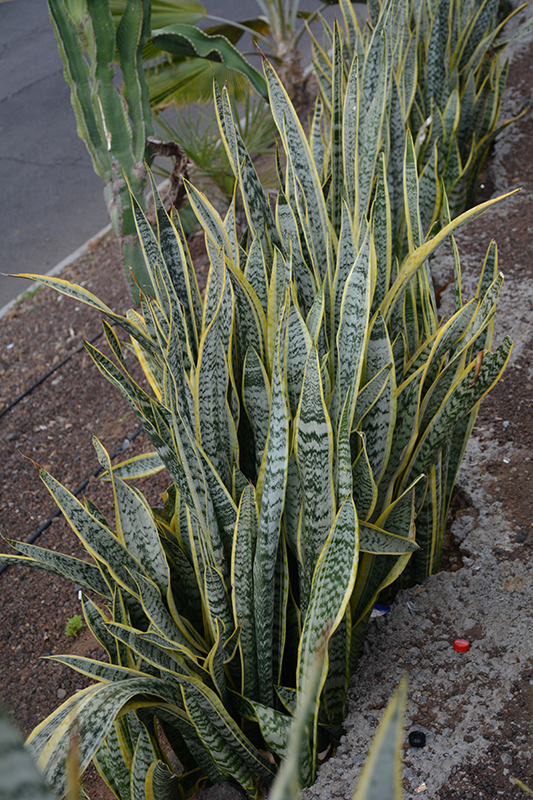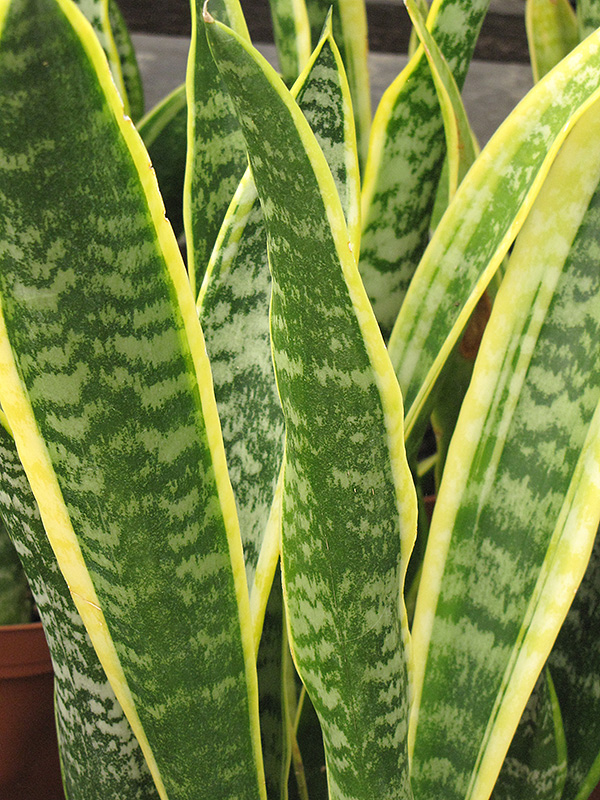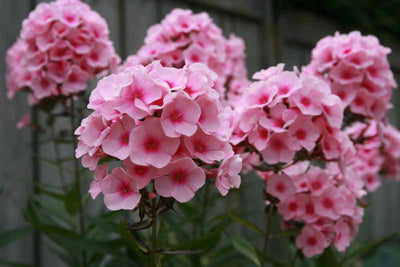Plant Library
Striped Snake Plant
Sansevieria trifasciata 'Laurentii'
Height: 4 feet
Spread: 18 inches
Sunlight:
![]()
![]()
Hardiness Zone: 10a
Other Names: Mother-In-Law's Tongue, Viper's Bowstring Hemp
Description:
This popular plant will form dense stands of vertical leaves, arranged in rosettes; produces green leaves with horizontal gray-green bands and vertical yellow margins; fragrant greenish-white flowers in spring, on mature plants, followed by orange berries
Ornamental Features
Striped Snake Plant features dainty fragrant light green spider-like flowers with white overtones along the stems in mid spring. Its attractive large twisted narrow leaves remain forest green in color with distinctive yellow edges and tinges of grayish green throughout the year. It features an abundance of magnificent orange berries in mid summer.
Landscape Attributes
Striped Snake Plant is an herbaceous evergreen tropical plant with an upright spreading habit of growth. Its medium texture blends into the garden, but can always be balanced by a couple of finer or coarser plants for an effective composition.
This is a relatively low maintenance plant, and may require the occasional pruning to look its best. It has no significant negative characteristics.
Striped Snake Plant is recommended for the following landscape applications;
- Accent
- Vertical Accent
- Container Planting
Planting & Growing
This plant is native to the tropics and prefers growing in moist environments with evenly warm conditions all year round. In our climate, it is usually grown as an outdoor annual in the garden or in a container. If you want it to survive the winter, it can be brought in to the house and provided with special care, and then returned to the garden the following season. In its preferred tropical habitat, it can grow to be around 4 feet tall at maturity, with a spread of 18 inches. However, when grown as an annual or when overwintered indoors, it can be expected to perform differently, and its exact height and spread will depend on many factors; you may wish to consult with our experts as to how it might perform in your specific application and growing conditions.
This plant does best in partial shade to shade. It is very adaptable to both dry and moist growing conditions, but will not tolerate any standing water. It is considered to be drought-tolerant, and thus makes an ideal choice for a low-water garden or xeriscape application. It is not particular as to soil pH, but grows best in sandy soils. It is highly tolerant of urban pollution and will even thrive in inner city environments. This is a selected variety of a species not originally from North America. It can be propagated by division; however, as a cultivated variety, be aware that it may be subject to certain restrictions or prohibitions on propagation.
Striped Snake Plant is a fine choice for the garden, but it is also a good selection for planting in outdoor pots and containers. With its upright habit of growth, it is best suited for use as a 'thriller' in the 'spiller-thriller-filler' container combination; plant it near the center of the pot, surrounded by smaller plants and those that spill over the edges. It is even sizeable enough that it can be grown alone in a suitable container. Note that when growing plants in outdoor containers and baskets, they may require more frequent waterings than they would in the yard or garden. Be aware that in our climate, this plant may be too tender to survive the winter if left outdoors in a container. Contact our experts for more information on how to protect it over the winter months.
-- THIS IS A TROPICAL PLANT AND SHOULD NOT BE EXPECTED TO SURVIVE THE WINTER OUTDOORS IN OUR CLIMATE --






